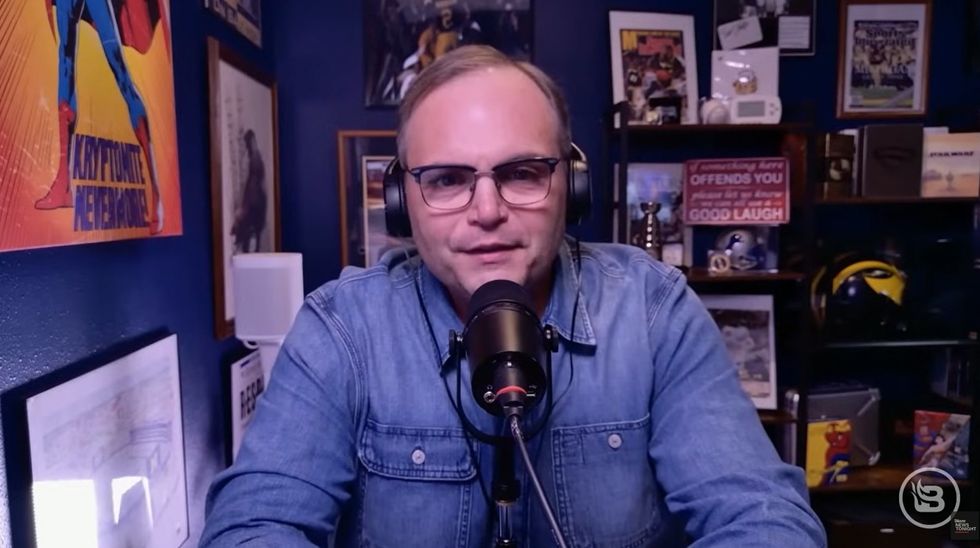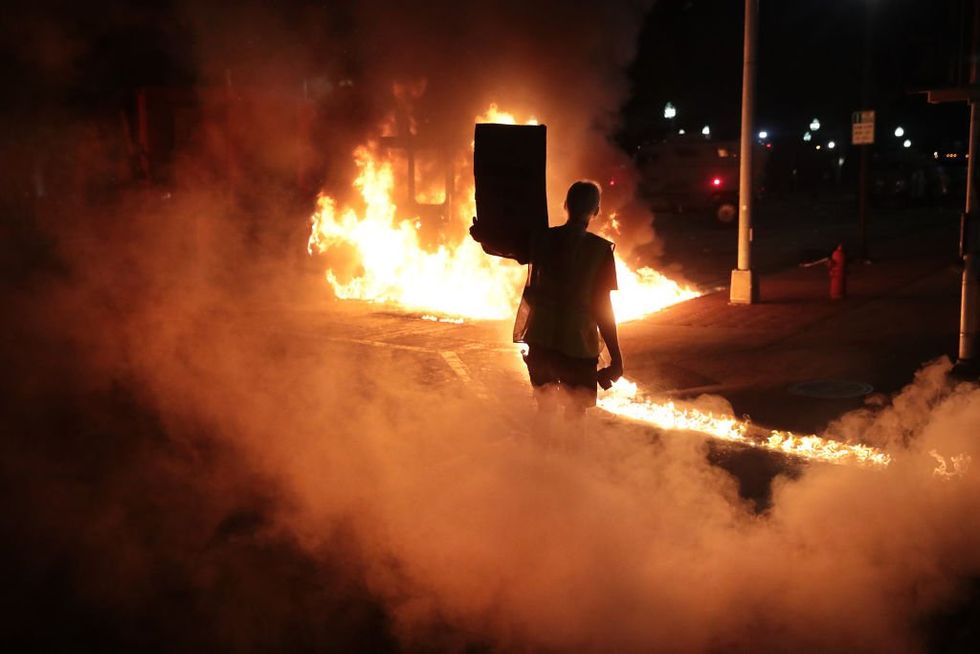New York Times and Media Matters team up to censor BlazeTV hosts and other conservatives
The New York Times and the leftist outfit Media Matters dropped complementary hit pieces Thursday, accusing BlazeTV hosts Steve Deace, Mark Levin, and Jason Whitlock — along with various other prominent voices in conservative media, including Tucker Carlson, Ben Shapiro, Michael Knowles, and Lara Trump — of "election misinformation." The apparent aim of this coordinated attack, which the Washington Post did its part to reinforce, is to pressure the Google-owned platform YouTube to demonetize or possibly even deplatform Democrats' ideological opponents before Election Day. "Being lumped in with those fine fellows, and being labeled an enemy number one from the official Pravda of the regime, is truly the greatest honor of my career," Deace told Blaze News. 'It defines "false claims" and "election misinformation" so broadly.' Times reporter Nico Grant gave the plot away in advance when asking Tucker Carlson, Ben Shapiro, and Mike Davis of the Article III Project on Monday about their respective memberships in the YouTube Partner Program, their track records of demonetization, and history of notes from YouTube regarding "misinformation." Grant, whom Carlson told to "f*** off," indicated that Media Matters, a leftist organization founded by Democratic operative David Brock that is presently being sued by Elon Musk for alleged defamation, identified "286 YouTube videos between May and August that contained election misinformation, including narratives that have been debunked or are not supported with credible evidence." Blaze News previously reached out to the Times and Media Matters for a working definition of "misinformation" but did not receive a response from either outfit. As a result, it remains unclear whether the Times' false or misleading reports about Russian collusion, former Covington Catholic student Nicholas Sandmann, the death of U.S. Capitol Police Officer Brian Sicknick, and jihadists' missile misfire at a Gazan hospital would qualify. Journalists Matt Taibbi and Paul D. Thacker wrote Friday on the "Racket News" Substack, "The problem with the Times piece is it defines 'false claims' and 'election misinformation' so broadly that legitimate questions or analyses and even jokes get wrapped in with far-out conspiracy tales." Media Matters did, however, shine some light on what sort of claims it apparently feels should not be uttered on YouTube, namely: suggestions "that the election process is 'rigged' against Trump, that the legal cases against him constitute 'election interference,' that Democrats want and are enabling noncitizens to vote in order to win the election, and that Kamala Harris was 'illegally installed' as the Democratic nominee in a 'coup' against Joe Biden." If Media Matters gets its way, then YouTube might penalize critics for highlighting the unmistakable efforts by Democrats to throw Trump in prison before the election and to remove him from the ballot; Democratic lawmakers' publicly stated plans to invalidate a lawful Trump victory; the Biden-Harris Department of Justice's lawsuits aimed at restoring the voter registration of thousands of suspected foreign nationals; or for questioning the nature of Biden's ouster as Democratic candidate and Harris' voteless candidacy. Media Matters specifically complained that BlazeTV host Mark Levin said in May that Democrats "will do anything for votes — imprison Trump, steal elections," and that Democrats would "change the electoral process" to get more votes. The Democratic attack dog attacked Levin further for apparently suggesting in July that Democrats "stole the election from their own primary voters and they're going to install somebody who hasn't gotten a single delegate on her own." Media Matters also set its sights on Deace, complaining: Right-wing radio host Steve Deace said Democrats would be "dropping ballots" and "bussing people in … to keep the spigot going until they get what they want" on Election Day. Deace continued, "All they’re trying to do is make her credible enough so they can fortify this thing at the end here." Media Matters was apparently distressed to learn that Deace could exercise his First Amendment rights and suggest on YouTube that Democrats might want to get the polls "within their narrative margin to justify cheating." The hit piece also noted that BlazeTV host Jason Whitlock accused California of "manipulat[ing] voting." A YouTube spokeswoman told the Times that the company reviewed eight videos identified by the liberal paper and found that none of them violated its community guidelines. However, that's not what the Times originally reported. 'But what they meant for evil, I will choose to use for good.' "A YouTube spokeswoman said none of the 286 videos violated its community guidelines," wrote Grant. The Times has since issued a correction: An earlier version of this article misstated the number of videos that YouTube reviewed when asked for comment on


The New York Times and the leftist outfit Media Matters dropped complementary hit pieces Thursday, accusing BlazeTV hosts Steve Deace, Mark Levin, and Jason Whitlock — along with various other prominent voices in conservative media, including Tucker Carlson, Ben Shapiro, Michael Knowles, and Lara Trump — of "election misinformation."
The apparent aim of this coordinated attack, which the Washington Post did its part to reinforce, is to pressure the Google-owned platform YouTube to demonetize or possibly even deplatform Democrats' ideological opponents before Election Day.
"Being lumped in with those fine fellows, and being labeled an enemy number one from the official Pravda of the regime, is truly the greatest honor of my career," Deace told Blaze News.
'It defines "false claims" and "election misinformation" so broadly.'
Times reporter Nico Grant gave the plot away in advance when asking Tucker Carlson, Ben Shapiro, and Mike Davis of the Article III Project on Monday about their respective memberships in the YouTube Partner Program, their track records of demonetization, and history of notes from YouTube regarding "misinformation."
Grant, whom Carlson told to "f*** off," indicated that Media Matters, a leftist organization founded by Democratic operative David Brock that is presently being sued by Elon Musk for alleged defamation, identified "286 YouTube videos between May and August that contained election misinformation, including narratives that have been debunked or are not supported with credible evidence."
Blaze News previously reached out to the Times and Media Matters for a working definition of "misinformation" but did not receive a response from either outfit. As a result, it remains unclear whether the Times' false or misleading reports about Russian collusion, former Covington Catholic student Nicholas Sandmann, the death of U.S. Capitol Police Officer Brian Sicknick, and jihadists' missile misfire at a Gazan hospital would qualify.
Journalists Matt Taibbi and Paul D. Thacker wrote Friday on the "Racket News" Substack, "The problem with the Times piece is it defines 'false claims' and 'election misinformation' so broadly that legitimate questions or analyses and even jokes get wrapped in with far-out conspiracy tales."
Media Matters did, however, shine some light on what sort of claims it apparently feels should not be uttered on YouTube, namely: suggestions "that the election process is 'rigged' against Trump, that the legal cases against him constitute 'election interference,' that Democrats want and are enabling noncitizens to vote in order to win the election, and that Kamala Harris was 'illegally installed' as the Democratic nominee in a 'coup' against Joe Biden."
If Media Matters gets its way, then YouTube might penalize critics for highlighting the unmistakable efforts by Democrats to throw Trump in prison before the election and to remove him from the ballot; Democratic lawmakers' publicly stated plans to invalidate a lawful Trump victory; the Biden-Harris Department of Justice's lawsuits aimed at restoring the voter registration of thousands of suspected foreign nationals; or for questioning the nature of Biden's ouster as Democratic candidate and Harris' voteless candidacy.
Media Matters specifically complained that BlazeTV host Mark Levin said in May that Democrats "will do anything for votes — imprison Trump, steal elections," and that Democrats would "change the electoral process" to get more votes.
The Democratic attack dog attacked Levin further for apparently suggesting in July that Democrats "stole the election from their own primary voters and they're going to install somebody who hasn't gotten a single delegate on her own."
Media Matters also set its sights on Deace, complaining:
Right-wing radio host Steve Deace said Democrats would be "dropping ballots" and "bussing people in … to keep the spigot going until they get what they want" on Election Day. Deace continued, "All they’re trying to do is make her credible enough so they can fortify this thing at the end here."
Media Matters was apparently distressed to learn that Deace could exercise his First Amendment rights and suggest on YouTube that Democrats might want to get the polls "within their narrative margin to justify cheating."
The hit piece also noted that BlazeTV host Jason Whitlock accused California of "manipulat[ing] voting."
A YouTube spokeswoman told the Times that the company reviewed eight videos identified by the liberal paper and found that none of them violated its community guidelines. However, that's not what the Times originally reported.
'But what they meant for evil, I will choose to use for good.'
"A YouTube spokeswoman said none of the 286 videos violated its community guidelines," wrote Grant.
The Times has since issued a correction:
An earlier version of this article misstated the number of videos that YouTube reviewed when asked for comment on whether they contained misinformation. YouTube said it reviewed eight videos, which were identified by The New York Times and referenced in the article, not all of them, and found that those eight did not violate its community guidelines; it did not comment on whether they contained misinformation.
The YouTube spokeswoman whose response was initially misrepresented by the Times apparently also told Grant, "The ability to openly debate political ideas, even those that are controversial, is an important value — especially in the midst of election season."
Evidently not all are keen on open debate and free speech.
Kayla Gogarty, an LGBT activist who interned at the Human Rights Campaign before becoming "research director" at Media Matters, said, "YouTube is allowing these right-wing accounts and channels to undermine the 2024 results."
Media Matters was not entirely impotent regarding its censorious crusade. The Times indicated that YouTube censored three videos and placed "information labels" that link to supposedly factual information on 21 other videos.
Deace told Blaze News, "The timing of this hit piece is obviously to induce Google, which also owns YouTube and thus the two largest search engines on this planet, to censor those of us who are among the most effective in deconstructing the Left's attempts to deconstruct America right before the election. But what they meant for evil, I will choose to use for good."
Taibbi and Thacker summarized the attack campaign thusly:
A DNC-aligned group produces a "report" documenting a sciencey-sounding quantity of "misinformation" incidents, then passes the scary number to a politically willing mainstream news outlet, which trumpets the new "facts" while publicly and privately pressuring platforms to remove offending material. Welcome to the new "accountability journalism."
Like Blaze News? Bypass the censors, sign up for our newsletters, and get stories like this direct to your inbox. Sign up here!
Originally Published at Daily Wire, World Net Daily, or The Blaze
What's Your Reaction?

































































































